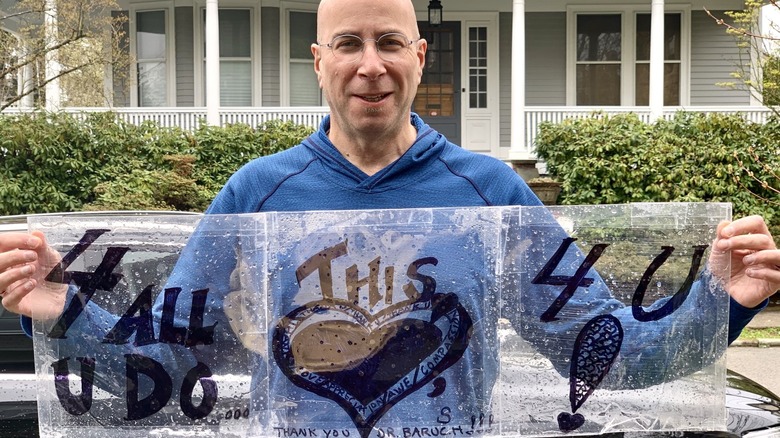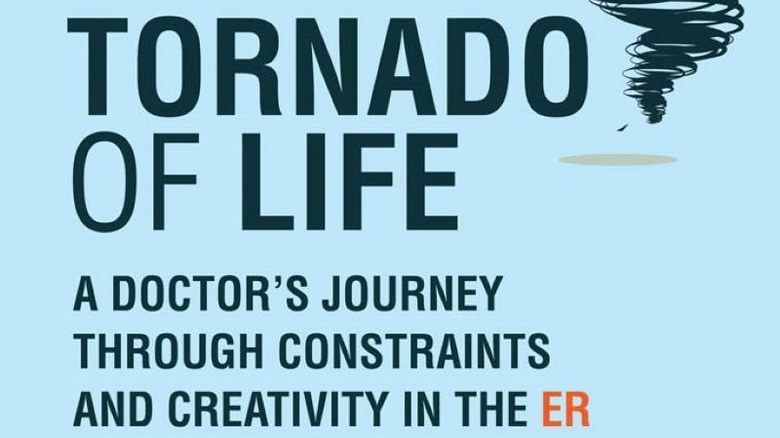Emergency Room Doctor Jay Baruch On How To Advocate For Yourself And Loved Ones In The ER — Exclusive Interview
Dr. Jay Baruch's path to emergency medicine was anything but direct. When he went to college, Baruch was an English major with the intention of becoming an author and professor. He was fascinated by humanity and the stories generated by the drama of everyday life.
That fascination pulled Baruch to change gears and study psychiatry. However, a rotation in the emergency room during medical school changed his path yet again. The "controlled chaos," as he put it, of the emergency room and the opportunity to care for people who couldn't get medical attention anywhere else captivated Baruch. So he dove in headfirst and never looked back.
In his years working in the emergency room, Dr. Baruch has learned that even when time is of the essence and he's working at top speed to make a diagnosis, taking the time to slow down and actively listen to his patients' stories is the most essential aspect of patient care. Though it's not always easy, it always pays off. And when doctors don't take the time to get the whole story, even if it doesn't seem like it has anything to do with the patient's symptoms, it can lead to heartbreaking outcomes.
In this exclusive interview with Health Digest, Dr. Baruch discussed why patient stories are so crucial to good care, how patients can advocate for themselves and their loved ones, and his upcoming book, "Tornado of Life: A Doctor's Journey through Constraints and Creativity in the ER."
Revealing the real stories of the ER
Can you tell us a bit about your background and why you chose emergency medicine?
I went to college intending to become a writer and an English professor. I've always loved books and literature. But [a] love of stories and a fascination with people pulled me into medicine. Initially, I was planning on going into psychiatry. I was fascinated by the mind, how it works, and how it goes awry. But then I did a rotation in emergency medicine. I loved the social justice mission, caring for people who couldn't get care elsewhere, and the controlled chaos of the space.
This is a long time ago — late 1980s, early '90s. The show "ER" hadn't even aired yet. Emergency medicine, though established, was still a young and upstart specialty at the time. And the artist side of me enjoyed the outlaw and irreverent spirit of ER, the immense breadth of human and social problems that poured through the door, the team spirit of ER staff, the heartache, and the humor. Being in a position to help someone in a moment of need felt like a great privilege.
What inspired you to write a book about working in the ER?
It often felt like those aspects of emergency medicine that I found troubling or challenging were the quieter situations, not the high-wattage drama portrayed on the screen. Among ER staff and colleagues, they usually [spoke] in a passing, "by the way" manner, if at all. I think we all have these moments, whether at work or home, moments that are fragile or embarrassing or scary or overwhelming, and because of that, we keep them to ourselves. Writing has always been my method of working through problems, hearing myself think, and facing the complexity of the smallest moments with sometimes brutal honesty. Most of the writing is private and lives in journals or folders — real and in the cloud. Sometimes, an urgency grows. The situation repeats itself. Others talk about similar moments with frustration or distress in their voices. I wanted to put a voice to those experiences.
What's the right thing to do when the "right thing" is the very thing in question? Sometimes, there's no map for caring for others. These moments can be uncomfortable, and I wanted to be honest about that discomfort and try to share that struggle by taking readers into the experience and showing how it feels to move from story to story as we do in the ER, from one emotional place to another.
I hope the reader will walk away with a different lens into the ER. We know it can be a challenging place to be a patient.
The stories patients tell
Early on in your book, you talk about the different types of stories you hear in the ER. Can you explain those categories and how they help you understand a patient?
In the title essay, I reference the incredible book "The Wounded Storyteller: Body, Illness, and Ethics" by the sociologist and narrative scholar Arthur Frank. I'll do a disservice to his brilliance and eloquence. Still, loosely, he suggests that we consider illness experiences and the stories told about them through three different narrative arcs: restitution narratives, quest narratives, and chaos narratives.
Restitution stories, in broad strokes, are the standard medication commercials on TV. You were living your life in the land of the well when illness suddenly struck. But thanks to the wonders of medical technology, the scientific promise in the purple pill, or red or blue, you're cured.
Quest stories borrow from the work of Joseph Campbell. It's illness as a journey. You're well, then you depart into the land of the ill. You're initiated into this other place, where you'll face many tests and challenges. The trials you endure — physical, emotional, and social — will transform you. If you are fortunate [enough] to return to the land of the well, you will not be the same person who left.
Chaos stories are the third of Frank's narratives, and I believe they're the most challenging type of story that patients share in my emergency medicine practice. They signal a complete loss of control. Frank points out that certain troubles run so deep that putting language to these experiences can be difficult, if not impossible.
These terms aren't rigid boxes but fluid lenses. Frank claims that the same patient might alternate between these different types of stories during the same illness.
Medicine prides itself on restitution narratives and the pretense of control. But what to do when the patient's story doesn't fit this storyline? For example, a fundamental challenge when listening to a chaos narrative is not steering the patient away from their feelings and just listen[ing]. "To deny a chaos story is to deny the person telling the story," wrote Frank, "and people who are being denied cannot be cared for."
"The Wounded Storyteller" is a wise and profound book, scholarly but readable. I can't recommend it enough to anyone interested in narratives and experiences of illness.
How stories inform patient care
Why the focus on patients' stories? How does that help you provide better care?
I can't care for patients unless I care for their stories. I get a better sense of their troubles, fears, hopes, etc. through stories. Often, they share experiences that are difficult to put into words. Sometimes, most important is what's left out, and I have to be savvy [about] the gaps in their stories. The rush to find an answer is often premature.
Sometimes patients aren't seeking a diagnosis but comfort or having someone tell them they're doing an excellent job under pressing circumstances. Sometimes, a chest pain complaint is an excuse to stay off the streets for a night. Listening means being able to read between the lines. The best medicine won't work on the wrong story.
Can you tell us about a time when taking the time to actively listen to a patient's story helped you catch a diagnosis you might have missed if you hadn't taken the time?
I describe a situation when a patient with advanced cancer who was near death came to the ER but wouldn't tell me why. An elusive diagnosis wasn't the problem. Her medical record chronicled her tragic clinical course, including the futility of chemotherapy and her transition from a sweet patient to a "difficult" one. Trying to figure out the purpose of the visit presented an unusual challenge. The essay describes my attempts to figure out what motivated this courageous woman.
How can people who are in the ER communicate effectively with their doctors?
If possible, come with your family, friend, [or] loved one to the ER. Don't be afraid to bring notes. If you're worried you might omit a vital detail or want to get certain dates right, then right it down. An up-to-date medication list is also very helpful, and include any medication allergies.
Communication became more problematic with masks. If you can, speak up. And if you can't make out what we're saying, please tell us. If you have trouble hearing, let us know. Ask for an interpreter if you don't speak English or are partially fluent. In the end, these measures save time and promote better understanding.
We realize that patients tell us details that can be difficult. Please don't withhold what might be important information that you might consider embarrassing, anxiety-provoking, and highly personal. Please mention if there are others in the room and you'd prefer not to share it with them. Please share if you feel we've cut you off prematurely or that we're leaving the room when there's more you wanted to tell us. If there's anything you don't understand, please ask us to repeat what we said or explain it in more detail. Please, ask questions.
Advocating for ourselves and loved ones in the ER
How can family members of those in the ER advocate for their loved ones and ensure they get the care they need?
If family members can't be there in person — let's say, because someone must watch the kids or COVID restrictions limit ER visits during critical moments — be sure to share with the healthcare team — nurses and doctor — the name and contact phone number of someone. That is very helpful for us. And ask if they can make sure that it's in the medical record.
If you're waiting a long time, and you're in pain or not looking well, then respectfully talk to the staff. If you're frail and live on your own and your family believes you might need some assistance at home, or they have concerns about your ability to care for yourself, they should share their concerns with the staff.
Speak up or find us if there are bits of information you feel we should know. Most important, be an advocate. Don't be afraid to speak up. (If possible, be respectful and understanding.) In the book, I write about several situations when a patient's family member alerted us to patient problems and the disturbing consequences of health care system problems.
How can people in the ER identify which details to tell their doctors?
This can be hard. Most patients haven't been to medical school, and we can't expect them to know how to distinguish important from unimportant information.
What other advice do you have for people who end up in the ER, for themselves or their loved ones?
From my experience as a patient in the ER, I know that ERs can be a scary, stressful place. There's so much going on. It's busy. Sometimes you're waiting for a long time. Please tell us if you're waiting and you're not feeling well. Please tell us if you feel you've been forgotten. Please share with us any change in your condition. Please remind us if you're waiting for lab or diagnostic imaging results. If you don't understand something, ask us to explain it again. I can't emphasize this enough.
Remember, the ER staff is doing their best under often trying circumstances. We're on your side.
Dr. Baruch's new book, "Tornado of Life: A Doctor's Journey through Constraints and Creativity in the ER," will be released on August 30, 2022.





